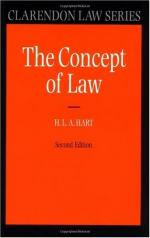
|
| Name: _________________________ | Period: ___________________ |
This test consists of 15 multiple choice questions and 5 short answer questions.
Multiple Choice Questions
1. What could we rest with according to Hart?
(a) Reminders about how we use the concept.
(b) Reminders on the reward of obeying.
(c) Reminders on how to obey.
(d) Reminders on the risk of disobeying.
2. What could the definition of law provide a map for?
(a) Explain society.
(b) Explain man's evolution.
(c) Explain order.
(d) Explaining relationships
3. What shares the same drawback as a book of statuses?
(a) Ratified legislation.
(b) Set of ratified legislation or judicial rulings.
(c) Custom laws.
(d) Set of precedent.
4. What do Hart say of making sense of authority in term of sovereign people?
(a) It is easy to understand.
(b) It is problematic.
(c) It is necessary.
(d) It is stable.
5. What do laws regulate in advance?
(a) Offenses.
(b) Precedent.
(c) Changes in morale.
(d) Succession.
6. What does the distinction make sense of, according to Hart?
(a) How custom is structured.
(b) How law should work.
(c) How moral is structured.
(d) Many difficulties previously unsolved.
7. What would breaking the rule do to society?
(a) Make it stronger.
(b) Make it more punitive.
(c) Nothing.
(d) Hurt it.
8. How are laws obeyed?
(a) Barely.
(b) Usually.
(c) Characteristically.
(d) Fully.
9. How does Hart qualifies Province of Jurisprudence Determined, according to Chapter 2?
(a) As an effort to change the law.
(b) As an attempt to prevent laws from applying.
(c) As a bad attempt to analyze law.
(d) As the most serious attempt to analyze the concept of law.
10. What is law not understood as, according to the author of Province of Jurisprudence Determined?
(a) A suggestion.
(b) As command.
(c) As constance.
(d) As request or warning.
11. Which status is the closest to the Austin/coercive order model?
(a) Secondary status.
(b) Primary status.
(c) Civil statutes.
(d) Penal status.
12. What do Rules of continuity give future individuals the right to?
(a) Ignore the law.
(b) A fair trial.
(c) Assume the same power.
(d) Change laws.
13. Who is the habit of obedience understood to apply to?
(a) A limited group of people.
(b) Lawyers.
(c) Law makers.
(d) Law enforcement.
14. What are 'real' rules, according to Hart?
(a) Those created by elected officials.
(b) Those society agree must apply to all.
(c) Those society believe must be obeyed.
(d) Those descending from morale.
15. What do constitutions imply?
(a) Legal disabilities.
(b) Liberal laws.
(c) Structure goverment.
(d) Static laws.
Short Answer Questions
1. What is a common myth about laws?
2. Who denies there are true laws against murder?
3. How many questions did Hart identified that combine into the question of what law is?
4. What do constitutions specify?
5. What would allow all laws to be considered conditional orders to officials to apply sanctions?
|
This section contains 467 words (approx. 2 pages at 300 words per page) |

|




